See the steps to make a gorgeous magnolia wreath from freshly cut Magnolia Grandiflora leaves and incense cedar for fragrance. This attractive wreath works well for fall and through the holidays due to the rich, rusty brown indumentum on the underside of the magnolia leaves. When made with wire, this wreath will last well throughout the fall and winter months, and burnish to a lovely copper colour as it ages.
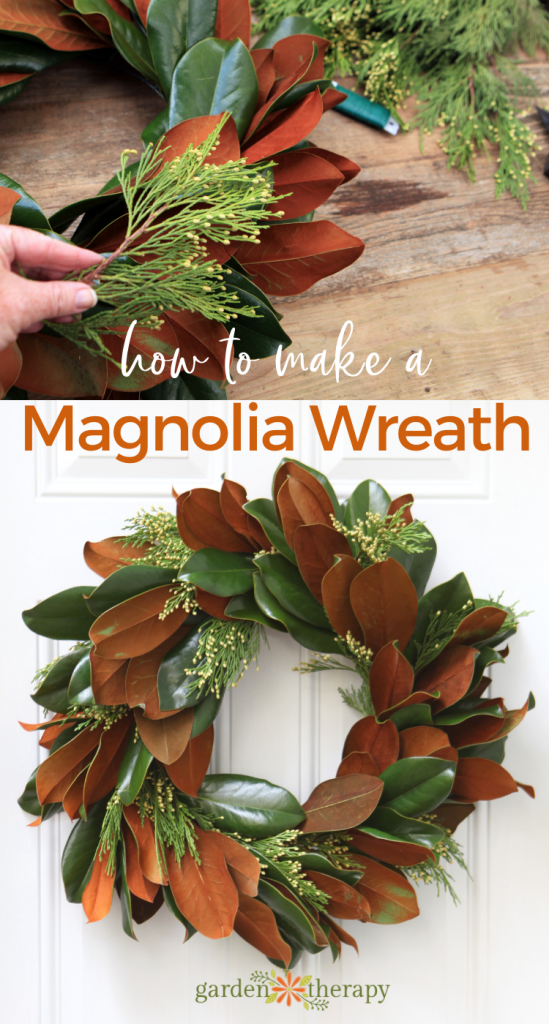
My old house had the most beautiful saucer magnolia that would burst with colour at the first sight of spring. On some magnolia trees, the flowers come long before the leaves do. It’s truly amazing to see flowers emerge from what looks to be a still dormant tree.
Elsewhere in Vancouver, I can find southern magnolia trees. These trees are the ones typically used for crafting and décor, and what I used to make my DIY magnolia wreath. Since they’re an evergreen, you can enjoy these magnolias yearround!
I’m so lucky to have magnolias around me that I can enjoy in the spring for their flowers and in the fall for their coppery leaves. Even if you can’t forage the leaves yourself, they’re often available in the fall for decorating or at a florist.
So grab some leaves and follow along with me for this classically beautiful and multi-purpose wreath.
Jump Ahead to…
- Why This Magnolia Leaf Wreath is So Special
- How to Make a Magnolia Wreath
- Materials
- Make it!
- How Long Will a Fresh Magnolia Wreath Last?
- Magnolia Varieties to Craft With
- Most Popular Magnolias for Cutting Material
- Best Magnolias for a Small Space
- Most Dramatic Magnolia Foliage
- Frequently Asked Questions About Magnolia Wreaths
- More Wreath-Making Projects
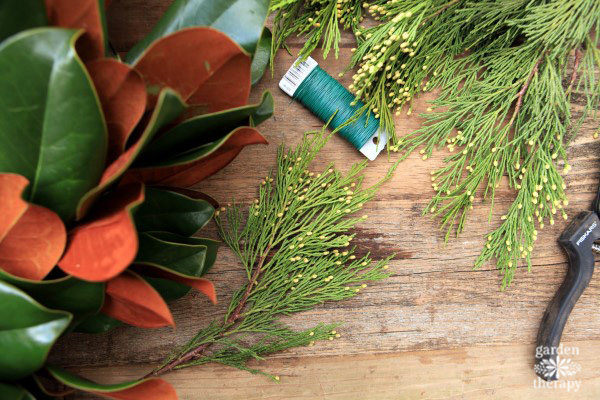
Why This Magnolia Leaf Wreath is So Special
I love experimenting with different wreaths, but one of my favourite plants to work with is Magnolia grandiflora because of the gorgeous, long-lasting foliage. I couldn’t be happier with how this one turned out!
The glossy leaves with textured undersides create an interesting contrast that looks unique and eye-catching while still maintaining the classic natural look of a fresh wreath. I have made many wreaths with fresh magnolia leaves, and they age to a coppery brown colour that makes the wreath even more charming.
Magnolias have an interesting botanical characteristic called indumentum, which is a layer of trichomes or small hairy looking bristles covering an area of a plant (in the case of magnolias, it is on the underside of the leaves). Indumentum works to protect plants from insects and help to control water absorption and sun damage.
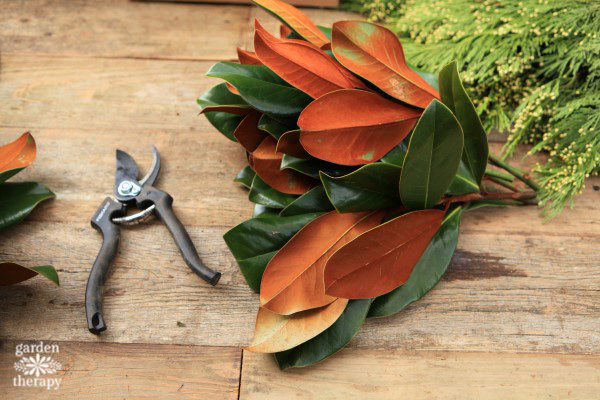
While many magnolias are prized in the spring for their scented blooms, Magnolia grandiflora is known for its foliage. It has attractive, dark green leaves with a rusty brown color peeking out from underneath.
The glossy green of the leaves would be attractive enough on its own, but the underside of each leaf is often covered with a thick brown or rust-colored indumentum, which creates a textural quality that looks like velvet.
The leaves don’t have that heavenly fragrance, so I added some incense cedar in my magnolia leaf wreath to up the scent. I do love the freshness that comes from evergreen wreaths hung on my door and incense cedar packs a punch (as you can imagine from its name).
How to Make a Magnolia Wreath
Sometimes, I love a wreath made almost exclusively out of one type of foliage. This DIY magnolia wreath looks stunning all on its own or with some extra sprigs of greenery. You can use it any time of year thanks to the evergreen leaves, but I especially love it as part of my fall decor.
Materials
- Magnolia grandiflora branches with leaves intact
- Wire wreath form
- Florist paddle wire
- Incense cedar, juniper berry branches, or seeded eucalyptus (optional)
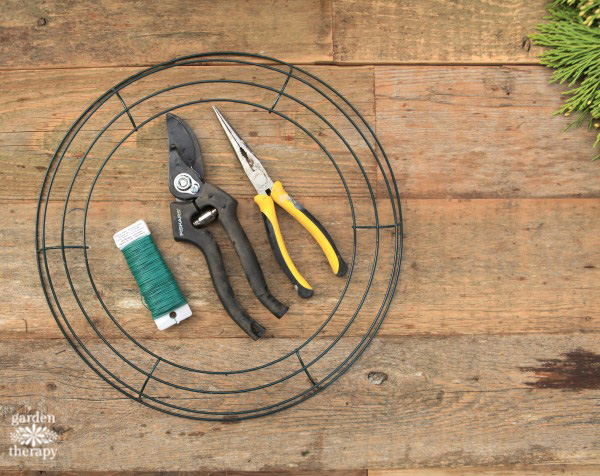
Make it!
- To begin, you will need a wire wreath form. Gather your magnolia clippings in small bundles before securing them to the wreath.
- Wrap each bundle around the wreath form with wire, overlapping them so that the stems are covered by the leaves of the next bundle. To see detailed instructions for attaching your bundles, head over to my tutorial on how to make an evergreen wreath.

- I use twine for most wreaths that are tossed in the compost after the holidays because it is compostable. But for a wreath that will last many months or even years, I use paddle wire.
- You can use a set of needle nose pliers to tighten the paddle wire as the branches dry out and shrink. Just turn the wreath over and gently twist the wire to tighten the hold on the branches.

- It’s not necessary to add anything other than magnolia leaves to the wreath, although a few branches of incense cedar, juniper berry branches, or seeded eucalyptus can add a little extra interest. I decided that my plain magnolia leaf wreath needed a little jazzing up.
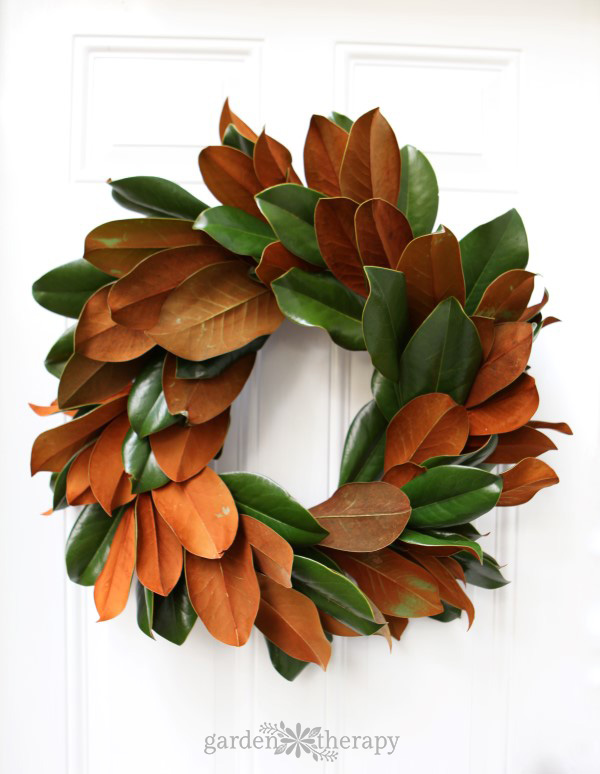
I love the way this incense cedar looks with the magnolia, plus it has a lovely fragrance, so I added some to my wreath in between the magnolia leaves.
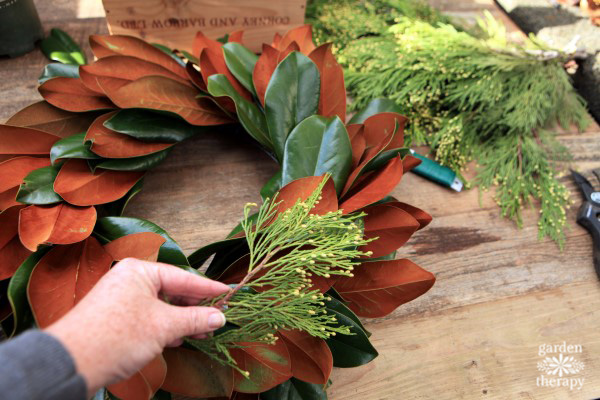
Now it’s perfect!
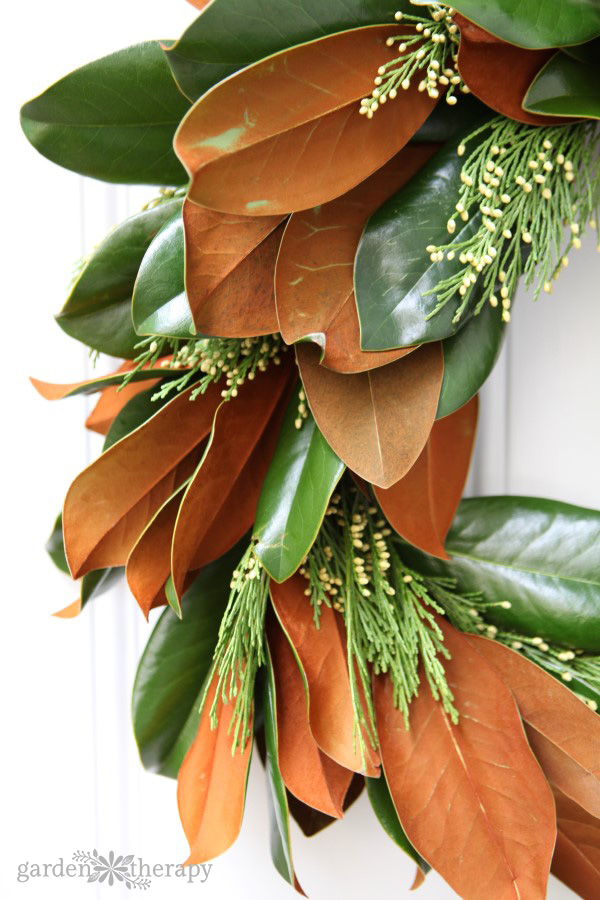
How Long Will a Fresh Magnolia Wreath Last?
In most areas, the wreath should last for a few months and look freshly crafted. Over time, the green leaves will fade to brown, but the indumentum will stay the same colour. The leaves will become more brittle as the wreath ages, so wipe it gently with a soft cloth to clean without breaking the leaves.
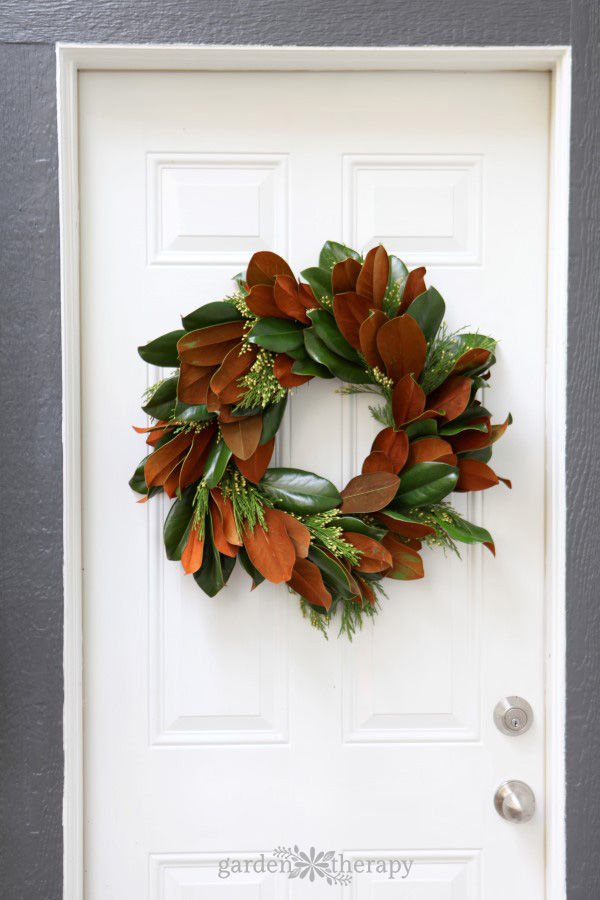
Magnolia Varieties to Craft With
Here are a few different types of magnolia that produce gorgeous foliage. If you are thinking of adding a magnolia to your garden, one of these will be just the thing—even if you only have space for a container garden!
A big thank you to my friends at Monrovia who sponsored this post, provided these gorgeous photos, and allowed me to share some of the varieties of magnolia that would work well for my project.
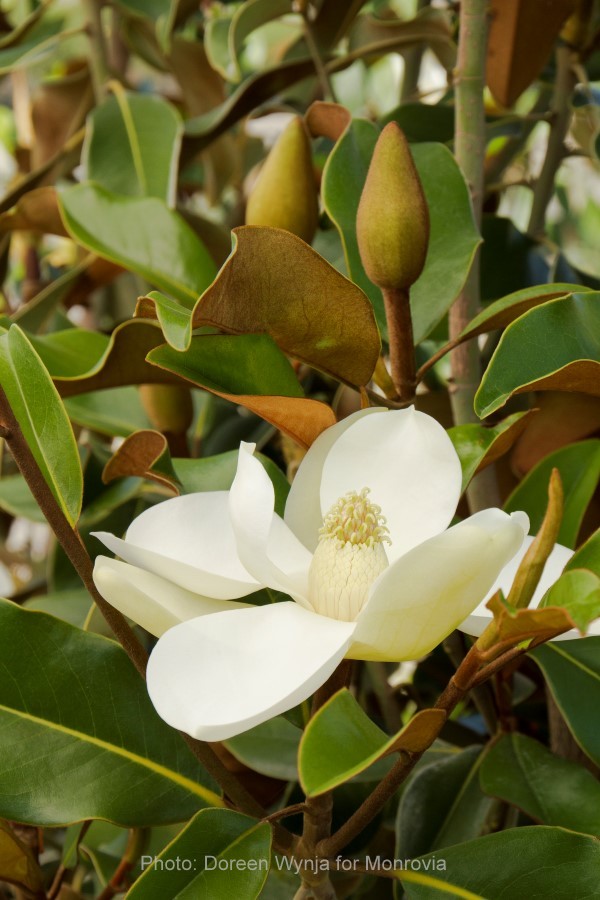
Most Popular Magnolias for Cutting Material
Bracken’s Brown Beauty Magnolia has bright green glossy leaves with a faded brown underside. Hardy in Zones 5-9.
D.D. Blanchard Southern Magnolia has large, very dark green glossy leaves with a bright, rust-coloured underside. Hardy in Zones 7-9.
Kay Parris Magnolia has much smaller leaves than the two listed above. The leaves are bright green and glossy, with a velvety underside and wavy edges that create an interesting shape. Hardy in Zones 6-9.
Best Magnolias for a Small Space
If you want to grow a magnolia but don’t have a lot of extra room, the Little Gem Dwarf Southern Magnolia is for you! It is bred specifically for container gardening, so you can get the beauty of a magnolia with whatever space limits you have. Hardy in Zones 7-9.
Teddy Bear Southern Magnolia is also a small space dream because of its upright habit. The shiny, deep green leaves have a heavy reddish-brown felt beneath and in the warm months, there are large 6- to 8-inch fragrant white flowers to enjoy. Hardy in Zones 7-9.
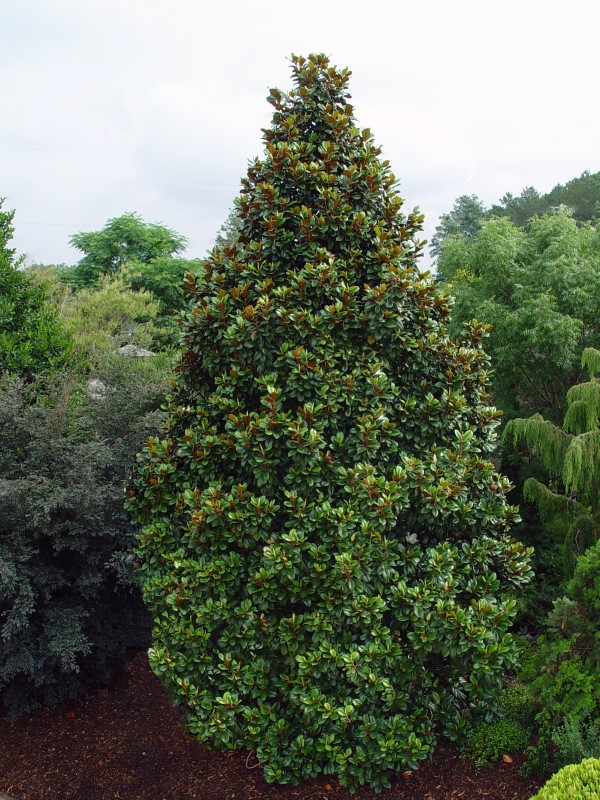
Most Dramatic Magnolia Foliage
For a really stunning display, check out the Alta Southern Magnolia. Its glossy leaves are such a dark green that they look almost black, which contrasts beautifully with the rusty undersides. Hardy in Zones 6-10.
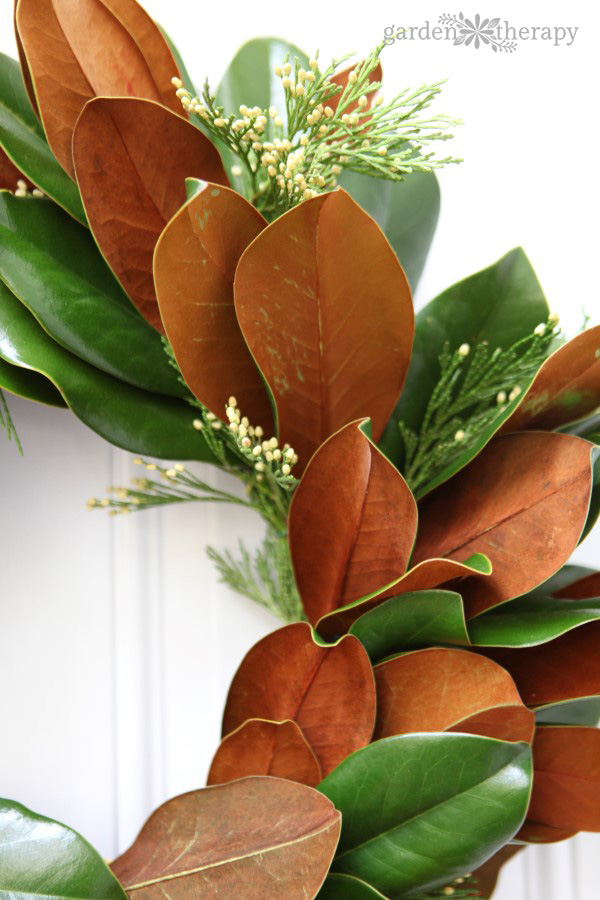
Frequently Asked Questions About Magnolia Wreaths
When taken care of, magnolia leaf wreaths can last for years. While they will lose their initial green colour, they remain a beautiful copper colour that works perfectly for fall décor.
The leaves will become soft and delicate the older they are, so handle them carefully. Gently dust and clean the wreath with a soft cloth.
When not in use, hang the wreath in a cool, dry location. Keep out of direct sunlight and avoid packaging, as the leaves can become easily damaged.
Like any leaves, the green will eventually fade to brown. However, the indumentum (the copper tiny bristles on the bottom) will keep its colour. You can try to prolong the life of a fresh wreath by misting it lightly with a small spray bottle (careful not to oversoak).
Some crafters will wash their leaves (which can damage them) and coat them with modge podge or glycerine to help keep their colour. They will still turn brown after a few weeks, with the odd one lasting longer.
In my experience, I like to leave them as is. It saves time, I can still compost them since they have no added chemicals, and I love the full copper colour even when the green fades.
Magnolias are actually one of the world’s oldest flowering plants. Due to this, it has a rich background and significance. Their long lifespan makes them a symbolism of endurance.
In ancient China, they represented femininity and gentleness. The Aztecs also grew magnolia trees for their beauty. They’re now am important symbol to the south thanks for the multitude of southern magnolia trees in the southern US States.
More Wreath-Making Projects
- Gardening for Your Front Door: Making a Fresh Wreath
- The Best Garden Greenery for Holiday Decorating (and Which Ones to Avoid)
- The Everything Wreath: Fresh, Festive, and Free
- How to Make a Grapevine Wreath Form
- A Very Merry Fresh Holly Wreath for Christmas
DIY Magnolia Wreath
Equipment
- Wire cutters
- Garden pruners
Supplies
- magnolia branches with leaves
- 1 wire wreath form
- florist paddle wire
- incense cedar, juniper berry branches, or seeded eucalyptus optional
Instructions
- Select small bundles of magnolia branches with the leaves still intact.
- Using the floral wire, secure the clippings to the wreath form. Make sure you overlap the bundles so that the stems are covered by leaves from the next bundle.
- Flip the magnolia wreath upside down and use pliers to pull the wire even tighter. This will help keep your magnolia secure.
- If you'd like, add embellishments to your wreath. I recommend incense cedar, juniper branches, or seeded eyucalyptus.
- Display and enjoy!

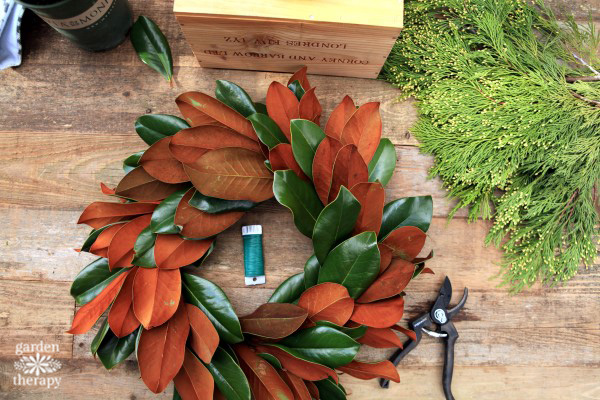
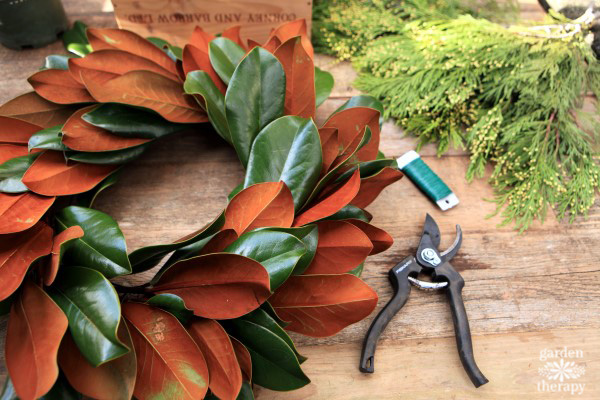
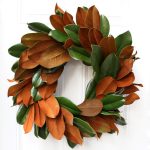
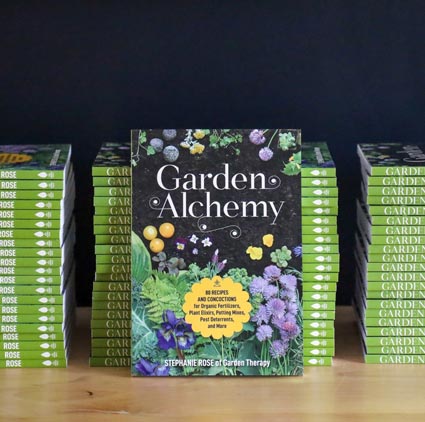


What size wire frame did you use? This is gorgeous! Thank you!
Thank you! I’m going to guess it was about 10″ diameter. The final wreath ends up a lot bigger than the form.
I enjoyed your tutorial and completed my magnolia wreath today. I added some okra from my summer garden and some pine cones from a camping trip last winter. Voila!
Hello,
Can you give me some ideas how to but together a heart shape magnolia wreath? I have notice pictures of heart shape wreaths but the leaves are not attach to wire frame.
Thank you
I love this wreath. So pretty for Fall.